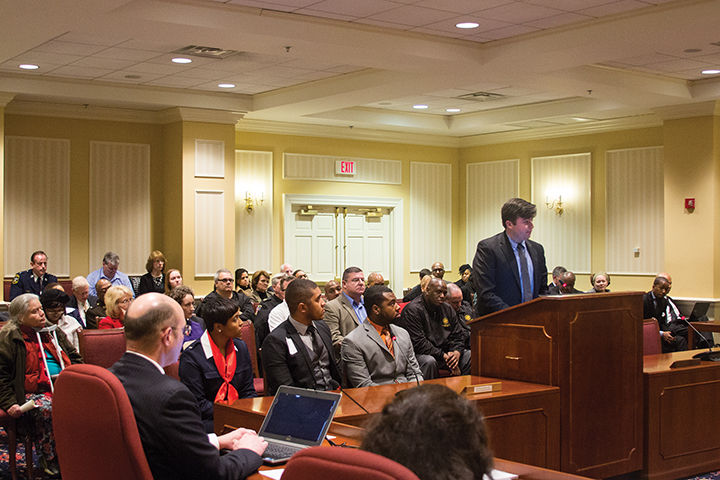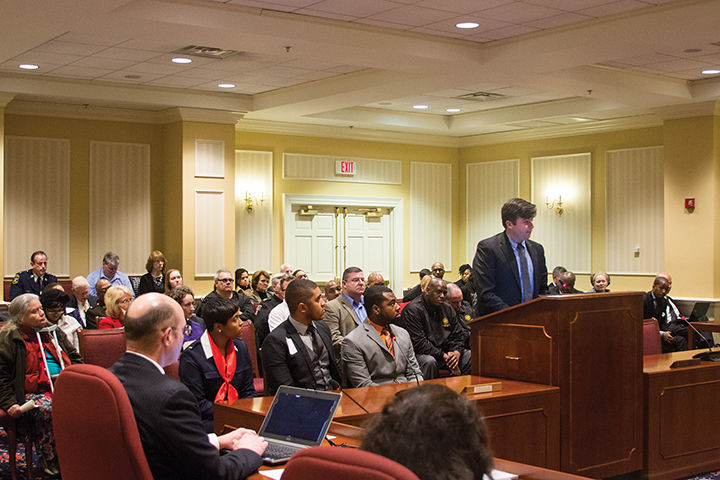During his sophomore year at Bowie State University, Kevin Hayes decided to pledge the university’s Alpha Phi Alpha fraternity chapter after learning that men like Martin Luther King Jr. and Thurgood Marshall had been members.
He said he was inspired by the way these men changed the world, and he wanted to do the same for his generation.
Hayes soon learned that the brotherhood was not like he imagined.
The fraternity set rules pledges had to abide by, such as not wearing colors other than black and gray, not socializing with other friends in public and not walking on the grass.
After one member accused Hayes of talking to a friend from his ROTC unit in the cafeteria, he was allegedly beaten repeatedly with a paddle, leaving bruises on his back, sides and buttocks.
“They said the whole point of us getting beaten was for us to learn better, work better under stress and become better men,” Hayes said. “I never understood that.”
Hayes, now a junior history major at Bowie State, testified at a Senate Judicial Proceedings Committee hearing Thursday in favor of a bill that would increase the criminal penalty of hazing in this state.
The bill, SB 394, would raise the fine for those convicted of hazing from $500 to $5,000 and expand the definition of hazing to “[subjecting] a student to the risk of serious bodily injury, regardless of whether injury actually occurs.”
The current law states “a person may not recklessly or intentionally do an act or create a situation that subjects a student to the risk of serious bodily injury for the purpose of an initiation into a student organization of a school, college, or university.”
Ryan Belcher, this university’s Student Government Association’s director of shared governance, testified at the hearing in support of the bill. He argued the intent to harm someone is damaging even if no injury occurs.
“One of the aspects of intent for bodily harm is psychological,” Belcher said. “Holding up a branding device to you if I was hazing and not actually do it, the fact is you have this red-hot, almost blue-hot, device getting really close to your face – that is going to cause some psychological issues.”
Belcher said increasing the penalty to $5,000 will have a much bigger impact and help deter this type of hazing.
“Some of these organizations operate with hundreds of thousands of dollars,” Belcher said. “$500 is nothing; it could be one party or a noise violation. $5,000 is a bigger financial blow to recover from. It shows it’s more serious.”
This university has seen instances of hazing over the past decade. In 2008, the Delta Tau Delta chapter was suspended after photographs emerged showing pledges lying in pools of their own vomit, and in 2002, then-university freshman Daniel Reardon died as a result of hazing.
One of the bill’s sponsors, Sen. Jamie Raskin (D-Montgomery), said he has spoken with universities about the need for a stricter hazing law.
“The colleges are asking us to make a much stronger statement about it, and we have to do what we can to get the message out to the fraternities,” Raskin said. “Higher education in Maryland should stand for our best values and not our worst values.”
Two other hazing victims testified at the hearing. Johnny Powell, a graduate of Stevenson University, said he was beaten with paddles so badly that he had to spend five days in the hospital.
“Not one of the fraternity members came to the hospital to apologize,” Powell said. “They were just like, ‘Tell them that you were having rough sex with your girlfriend,’ to make sure they didn’t get in trouble.”
Asya Trowell, who also testified, transferred to Stevenson from Penn State after members of a sorority she was pledging took her behind a church and hit her in the face until she bled, she said.
“The part that confuses me is I’m not sure why it’s so accepted in the community,” Trowell said. “I believe that speaking out may save lives. Telling my story may stop someone else from pursuing something they thought they wanted until they find out hazing is real.”
All three victims said they have filed charges against the people who hazed them. Trowell’s case in Pennsylvania ended with a misdemeanor, and the defendants were given community service, she said. Hayes and Powell said their cases are still pending in this state and they could not comment on their statuses.
Alpha Phi Alpha’s national website has an anti-hazing statement, but Hayes’ chapter could not be reached for comment.
“Alpha Phi Alpha Fraternity, Inc. strictly prohibits hazing in any form whether physical or mental as a term or condition of membership in the organization,” it reads. “Pledging has been officially abolished as a means of obtaining membership in Alpha Phi Alpha and pledge ‘lines’ have been officially abolished by the Fraternity.”
Sen. Nancy King (D-Montgomery), a co-sponsor of the bill, was a member of the Lambda Zeta Epsilon sorority at Niagara County Community College in New York. She said it is OK to have a pledge process as long as it doesn’t involve violence.
“Personally, I just think it needs to be toned down, if that’s possible,” King said. “I’ve gone through it myself in my sorority days, and it wasn’t a problem. But when you go over the limit and people start getting hurt, it’s a problem.”
Clarification: The fraternity that Johnny Powell alleges beat him with paddles was not a Stevenson fraternity. The described incidents allegedly occurred through a fraternity not affiliated with Stevenson and not located on Stevenson’s campus. There was no assertion that the alleged incidents involved any Stevenson employees.
Ryan Belcher, the SGA Director of Shared Governance, speaks at a senate judicial proceedings committee hearing on Thursday Feb. 26.
Kevin Hayes, a Bowie State junior, Asya Trowell, a Stevenson senior, and Johnny Powell, a Stevenson Alumna, in the Annapolis senate offices building on Thursday, Feb. 26.





